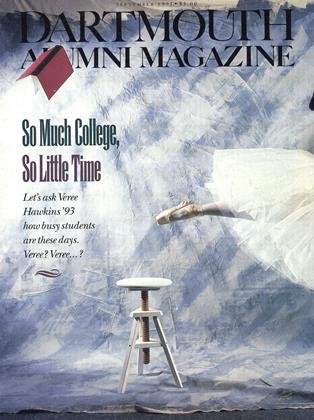I" wouldhope that a Dartmouth education teaches those great lessons of Nature."
WHEN HE WAS PRESIDENT, JOHN Sloan Dickey often referred to Dartmouth's "sense of place." Although "sense of place" is an evocatively imprecise concept, surely President Dickey meant that he felt about Hanover quite the opposite of how Gertrude Stein felt about Oakland, of which she said, "There is no there there."
Dartmouth attracts students not only for its academic quality but also for the beauty of its physical environment. Students come to Dartmouth because it combines the intimacy of a classic liberal arts college with an intellectual ambition typically found only at research universities. They also come for Hanover's brilliant autumn days painted russet and gold, its snowy winters of skiing, its verdant springs, and its summers of hiking and swimming.
One evening in the early 19705, when freshman trips had converged on Moosilauke Lodge, President Kemeny stood before the stone fireplace and answered questions. One freshman asked him how he thought Dartmouth's location had affected the character of the College. President Kemeny stated that he thought Dartmouth's setting had affected its character more than setting had influenced any other Ivy League institution "with the possible exception of New Haven." The students roared.
Like President Kemeny, I am an adopted son of Dartmouth. I studied law in New Haven, and remember my three years there fondly. And yet I understand President Kemeny's point about Dartmouth's setting, and join in the laughter.
There is something deeply moving and fundamentally important about the natural beauty that surrounds us here: whether one finds in the outdoors an opportunity to preserve and nurture a "private" self; whether one draws as poets, philosophers, and others have for millennia creative inspiration, inner strength, intuitive understanding, or a profound sense of the numinous from the quiet apprehension of the natural world; whether one finds, in natural beauty, solace from what Robert Frost calls "all this now too much for us" (it may be simply walking across the Green bathed in the gold of twilight, or viewing Baker Tower from Tuck Mall on a frosty winter morning); or whether one enjoys combining the robust exploration of the out-of-doors with the animated exploration of the limitless world of ideas, the very place Dartmouth gives to each of us more than we might ever repay
Numerous nineteenth-century American writers were fascinated by the relation between Man, Nature, and Place. Thoreau believed that mankind could find its true nature in the wild. That is why he wrote, "In wildness is the preservation of the world." Emerson said, "In the woods, we return to reason and faith." Walt Whitman, according to that astute critic Franz Kafka, "combined the contemplation of nature and civilization, which are apparendy entirely contradictory, into a single intoxicating vision of life." That vision was Whitman's vision of America.
Some nineteenth-century writers were particularly interested in the nexus between the character of their new nation and its natural setting its place. In spite of the corruption and cynicism of the Gilded Age, Whitman was able to retain his faith in America because he remained convinced, as Alfred Kazin observed, "that the country, like his own poetry, was one with Na- ture." And, as Whitman wrote in his apdy named manifesto Democratic Vistas, "the greatest lessons of Nature through the universe are perhaps the lessons of variety and freedom."
I would hope that a Dartmouth education the Dartmouth experience teaches those great lessons of Nature, that Dartmouth graduates recognize and celebrate both the infinite variety about them and the preeiousness of freedom.
I would hope that, in their time here, Dartmouth students, in Emerson's words, "return to reason and faith." And I would hope that after four years of living and learning in Dartmouth's natural setting, students come to a deeper understanding of their true natures, and that, better enlightened, they assume leading roles, as Thoreau wrote, in "the preservation of the world." H
 View Full Issue
View Full Issue
More From This Issue
-
 Feature
FeatureAN EXAM? LET ME TRY TO PENCIL IT IN
September 1991 By JONATHAN DOUGLAS '82 -
 Feature
FeatureThe Gate keeper
September 1991 By Jim Collins '84 -
 Feature
FeatureELECTRIC BODY LANGUAGE
September 1991 By JAY HEINRICHS -
 Feature
FeatureBio Rhythms
September 1991 -
 Article
ArticleDR. WHEELOCK'S JOURNAL
September 1991 By E. Wheelock -
 Article
ArticleAFTER THE WALL
September 1991 By Professor Konrad Kenkel
James O. Freedman
-
 Article
ArticleCOACHES AND PRESIDENTS
OCTOBER 1990 By James O. Freedman -
 Article
ArticleTHE PASSIONS OF SCIENCE
December 1990 By James O. Freedman -
 Article
ArticleNothing Less Than a Hero
April 1993 By James O. Freedman -
 Article
ArticleObligations of the Educated
September 1995 By James O. Freedman -
 Article
ArticleSkepticism and the Refined Mind
SEPTEMBER 1996 By James O. Freedman -
 Article
ArticleBack to the Future
JUNE 1998 By James O. Freedman
Article
-
 Article
ArticleALUMNI COUNCIL MEETS IN CHICAGO
December, 1925 -
 Article
ArticleKey to Abbreviations of Branches of Service
February 1943 -
 Article
ArticleHjalp for Swedes
December 1994 -
 Article
Articleabout the artist
Mar/Apr 2002 -
 Article
ArticleFATHERLY ADVICE OF 1819 REVEALED IN OLD LETTER
May, 1926 By M. Eastman -
 Article
ArticleSNOW ARTISTS
March 1936 By W. J. Minsch Jr. '36


